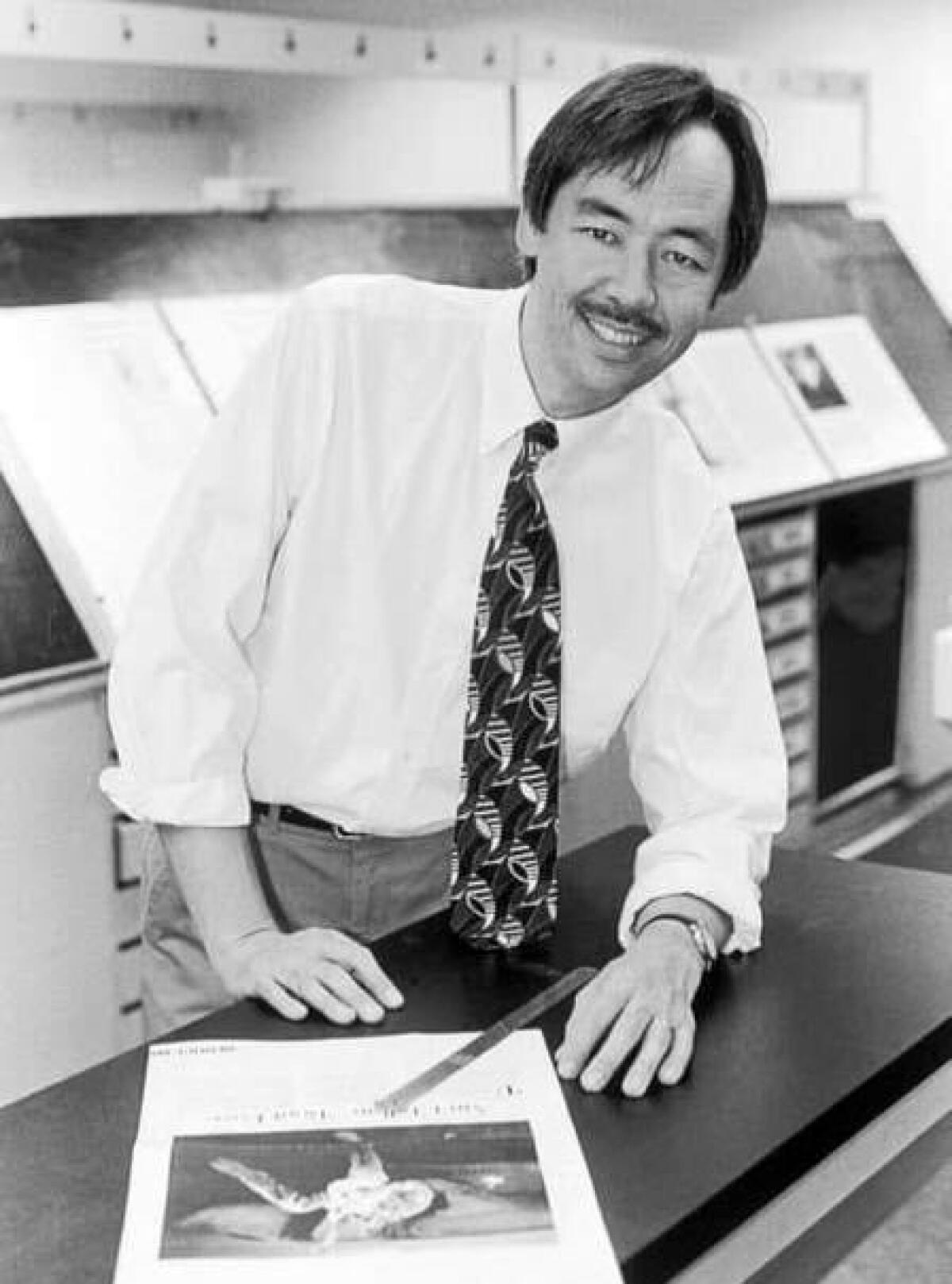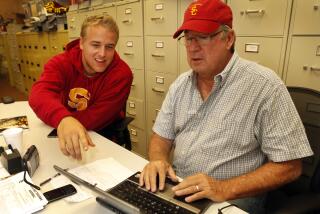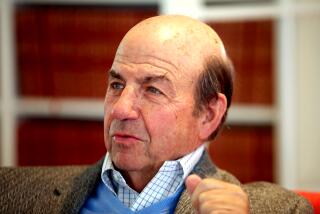Henry Fuhrmann, Times editor and ‘word nerd’ who fought for fairness in grammar, dies

No one had really paid too much attention to the hyphen. In matters of race and heritage — as in “African-Americans” or “Italian-Americans” — it was easily overlooked, an innocuous piece of punctuation that seemed to make sense.
Henry Fuhrmann thought otherwise. Journalist and self-described word nerd, Fuhrmann saw in the simple construction an unnecessary and derogative diminution of American identities and understood that no battle was too small in the fight for clarity, precision and fairness.
“Those hyphens,” he wrote in a 2019 essay, “serve to divide even as they are meant to connect. Their use in racial and ethnic identities can connote an otherness, a sense that people of color are somehow not full citizens or fully American.”
Tenacious and principled, Fuhrmann campaigned against its usage in newsrooms around the country and succeeded in persuading the profession’s high court, the Associated Press Stylebook, to rescind its dictate on the hyphen when referring “to an American person’s heritage.” At a national meeting of copy editors, Fuhrmann, who was an assistant managing editor for The Times until his retirement in 2015, received an ovation for his efforts.
A skilled, intuitive, sensitive practitioner of the written language, Fuhrmann died Wednesday after a brief and sudden illness, his family announced. He was 65.
“He was a pillar among us,” said John McIntyre, who recently retired as an editor at the Baltimore Sun. “His campaign to get rid of hyphenated Americanisms was a long slog and an ultimately triumphal one that was long overdue.”

But more than that, said McIntyre, Fuhrmann’s effort was part of a larger project “to develop an intelligent and informed style for our publications that was free from some of the superstitions and shibboleths that had burdened the business for a long time.”
Fuhrmann was “always attuned to the language as people use it and wanted to make it understandable to the people wanting to use it,” McIntyre said.
While at The Times, Fuhrmann initiated a change in usage from the outdated word “transvestite” to “transgender,” and more recently he championed the fight against the word “internment” when describing the incarceration of Japanese Americans during World War II.
“Being a word expert is not just knowing the rules,” said Ruthanne Salido, who supervises one of The Times’ copy desks. “It is also about being attuned to the changes in language that are bucking up against old language rules. Language is a living thing, and Henry was forward-thinking.”
Russ Stanton was editor of The Times when he asked Fuhrmann in 2009 to join the masthead. “He was a trusted advisor and colleague,” Stanton said. “His No. 1 goal was always do right and the best for our readers. That was his overarching concern. He put aside politics and personal interests to serve that goal.”
Fuhrmann’s job was to oversee the copy desk, which plays in the organization of newsrooms a critical and purposely isolated role away from reporters and their editors. Copy editors are like judges adjudicating grammatical disputes, managing fragile and pugnacious egos, and addressing demands for speed, accuracy and timeliness.
They bring to the work an appreciation of the underlying rules of language for bringing order to chaos of prose, and even as those rules change and adapt to currents in the culture, they must be enforced with exactitude and fairness. Fuhrmann valued these principles as much for life as for language.
The American son of a German Danish Navy corpsman and a Japanese mother, he was born on a U.S. hospital ship in Japan. He grew up in Port Hueneme, and a love for mathematics and calculus took him to Caltech. He wanted to be an engineer, but once he started putting out a student newspaper, he found his calling.
With a bachelor’s degree from Cal State L.A. and a master’s from Columbia University — both in journalism — and a stint with The Times’ Minority Editorial Training Program (later renamed The Times’ Fellowship), he was hired in 1991 as a copy editor for The Times’ Calendar section, where he brought clarity to many ambiguously and erroneously written sentences.
In the 2000s he was deputy editor of the Business section, and later, as more stories were being published online, he helped create style and usage rules for the new medium where none had existed.
“We launched a ton of blogs back then,” Stanton said. “They were a different animal compared to what we were used to. In a newsroom that had high standards and traditional ways of doing things, it took some getting used to, and Henry was key in helping us get comfortable in that space.”
In more recent years, as the expediency of social media brought casual flair to the niceties of grammar, syntax and punctuation, Fuhrmann was neither fussy nor pedantic. He knew that no matter the platform, be it a news story or a tweet, style and usage should align with the sensibility of readers. He applied this sensitivity to his work at The Times.
“In an environment where everyone is crusty, on deadline, hair on fire, Henry always found a way to always be reasonable, articulate and kind,” said Salido, who was married to Fuhrmann until 1999.
Few navigated the roiling waters of The Times newsroom with such diplomatic skill as Fuhrmann, who managed nearly 80 copy editors and was a tireless advocate for their work.
“He was well aware that speed matters more than ever,” said Salido, describing the hurried pace that online publishing brought to the work. “But he was also well aware that you have to get it right, and often that takes a couple of beats.”
Underlying his tact was a sly wit that bordered on gallows humor, as is often the case in newsrooms, and an ability to admit to mistakes, which is not often the case in newsrooms.
When “the best typographical error ever” appeared in The Times in 2012, Fuhrmann accepted responsibility. In a no-nonsense profile of a retired Las Vegas sheriff who was voted out of office, one sentence marked a critical transition in the story:
“Butt cracks eventually appeared in [the sheriff’s] public persona.”
Soon corrected and explained, the error allowed Fuhrmann to issue a credo: “Be forthright. Own up to your mistakes. Move on. And if nobody was injured, take time to laugh.”
Laughter is what former Times columnist Dan Neil still hears when he thinks back on the time he spent with Fuhrmann, who edited the stories that would win a 2003 Pulitzer Prize for criticism.
Always eager to test the limits of readers’ sensibilities, Neil remembers sitting shoulder to shoulder with Fuhrmann at his terminal, “punching up my column, cackling like idiots over grammatical fine points and too-blue entendres.”
“He never touched the copy but to make it better, smarter. I wish nights like those could go on forever,” Neil said.
With nearly 7,500 Twitter followers, he was also happy to enter the fray over any grammatical dustup. Like many, he once decried the rampant use of exclamation marks but later defended them, going so far as to make a case for the interrobang. “The all-purpose [?! combination] would come in handy in these uneasy times.”
On National Grammar Day (March 4), he annually issued three directives: “Believe, don’t peeve. Celebrate, don’t berate. Conjugate, don’t castigate.”
After leaving The Times at the end of 2015, Fuhrmann began “semi-retirement.” He was an adjunct professor at USC’s Annenberg School for Communication and Journalism, and last year was named editorial director for Bendable, a library-based online educational platform from the Drucker Institute.
Committed to the profession, he continued to serve on the executive board of a professional organization of editors, ACES: The Society for Editing, and with the Asian American Journalists Assn.
“Henry had an enormous impact on young journalists. He was such a compassionate, caring cheerleader,” said Teresa Watanabe, a friend and colleague at The Times. “He was also a legend in the Asian American Journalists Assn. for all that he did to mentor young students and young journalists and help make sure that coverage of Asian Americans and Pacific Islanders was fair and nuanced.”
Matt Stevens was a 22-year-old college senior when he first met Fuhrmann in 2011 at a board meeting for the local Asian American Journalists Assn. chapter. “He was this revered patriarch, the wisest, warmest mentor and friend to peers and young journalists,” recalled Stevens, a staff writer at the New York Times. “If you ever needed advice or a friendly listening ear, he was there.”
Stevens, who worked at The Times for five years, remembers being summoned to Fuhrmann’s office after a run of stories requiring corrections. “I was scared,” he said, “but rather than reprimand me, he encouraged me. He said that he — and The Times — had my back. I thought I was going to be fired, and instead I left feeling empowered and confident.”
Proud of his work and the ethos that guided it, Fuhrmann knew that the copy editing world that he once so firmly occupied was under siege by downsizing, budget cuts and cost-efficiency measures. He fought against eliminating jobs on the copy desk and against requiring his staff to punch a time clock.
Such assaults on the profession, argues McIntyre, have cast a cloud over his and Fuhrmann’s lifelong work.
“The minute and particular attention to language — the precision, accuracy and concision that copy desks could give a story — are gone now,” McIntyre said, “and we see embarrassing lapses in grammar and usage and large swaths of slack writing because it was judged too expensive to make it better.”
For his own part, Fuhrmann was happy to have taken on the hyphen and to have won. In a tweet closing 2019, he expressed his gratitude.
“As a legacy,” he wrote, “ ‘hyphen killer’ is not bad.”
Fuhrmann is survived by his wife, Lindi Dreibelbis; daughters Elena Fuhrmann and Angela Fuhrmann Knowles; and three siblings, Irene, David and Glen.
More to Read
Sign up for Essential California
The most important California stories and recommendations in your inbox every morning.
You may occasionally receive promotional content from the Los Angeles Times.











